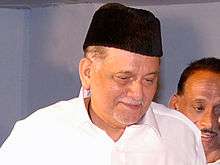Thangal
Thangal (meaning "Yourself", literally "Noble/Exalted Person") is a Malayalam (Kerala, India) honorific roughly equivalent to the more general term Sayyid/Sharif (descendant of Prophet Muhammad) in wider Islamic culture. The term "thangal", the plural of "than", is a personal pronoun that is a high form for "you" or "thou". It is generally used for speaking to noble or exalted men (represents the highest form of address in Malayalam).[1]

Some scholars consider the thangals as a 'community' among the Muslims of Kerala.[2] The thangal families are numerous in Kerala, all receive recognition, but only a few are regarded as saints. Thangal families have many gradations of status on social and economic scale. Influential of the thangals generally come from prominent business families. They usually exercise their influence through commerce and politics.[1]
Major thangal families in north Kerala.
- Tharamal family (Mambram)[1][3]
- Sayyid Jifri Thangal (mid-1700s)
- Hassan Jifri Thangal (mid-1700s)
- Syed Alavi Thangal (1749 - 1843)[3]
- Syed Fazl Thangal
- Pukkoya family (Panakkad)[1]
- Sayyid Ali Thangal
- Sayyid Husain ibn Muhlar (1812-1882)
- P. M. S. A. Pukkoya Thangal (d. 1975)
- Shihab Thangal (1936 - 2009)
- Hyderali Shihab Thangal (born 1947)
References
- Miller, Roland E., Mappila Muslim Culture. New York, State University of New York Press, 2015. pp. 268-271.
- Kunhali, V. "Muslim Communities in Kerala to 1798" PhD Dissertation Aligarh Muslim University (1986)
- Miller, Roland. E., "Mappila" in "The Encyclopedia of Islam". Volume VI. E. J. Brill, Leiden. 1987 pp. 458-56.
- Miller, Roland E., Mappila Muslim Culture. New York, State University of New York Press, 2015. pp. 268-271.